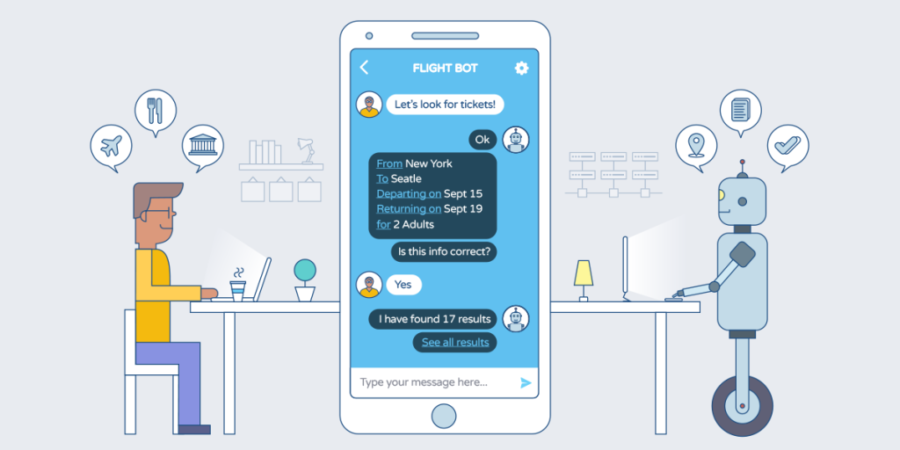Demystifying AI for Businesses
Learn about the common misconceptions business face surrounding AI and how AI could transform your business by improving efficiency, productivity and customer engagement.
Artificial Intelligence (AI) has become a transformative force in the business world, offering unprecedented opportunities for innovation, efficiency, and growth. However, for many business owners, the idea of adopting AI can be both exciting and daunting.
The rapid pace of technological advancements, coupled with widespread misconceptions, often leaves businesses wondering whether AI is applicable to their specific needs.
This article aims to demystify AI, address common misconceptions, and provide a clear path for businesses considering AI adoption.
Understanding AI: Separating Fact from Fiction
In November 2022, OpenAI released an AI tool called ChatGPT, which took the world by storm, amassing one million users within just five days.
For many, this was their first glimpse of generative AI, and they were astonished at how a chatbot could hold a conversation on any topic, generating its own insights.
This breakthrough highlighted the potential of AI in everyday applications and sparked widespread interest and curiosity.
According to the latest IBM Global AI Adoption Index, AI adoption is growing worldwide, with 35% of companies reporting using AI in their business and 42% considering adopting some form of AI.
However, a report by Capital Economics found that larger companies are more likely to adopt AI, with 68% of large companies utilising the technology compared to only 34% of medium-sized companies.
This disparity underscores the need for smaller businesses to better understand AI and its benefits.
AI – Practical Uses and the Benefits
Artificial Intelligence (AI) offers a wide range of opportunities for businesses to enhance efficiency, productivity, and customer satisfaction.
Here’s a comprehensive look at how AI can be applied across various business functions:
1. Streamlining Routine Tasks
AI can handle routine tasks such as data entry, inventory management, expense tracking, and appointment scheduling. By automating these mundane activities, businesses can free up human resources for more strategic and value-added activities.
2. Enhancing Customer Service
AI-powered chatbots can provide instant customer support, answer queries, and resolve issues efficiently. These chatbots can be deployed across various communication channels like websites, WhatsApp, Instagram, Messenger, and business applications such as Slack and Microsoft Teams, ensuring seamless customer interactions and enhancing overall customer satisfaction.
3. Revolutionising Business Marketing
AI can significantly improve marketing efforts by personalising content, forecasting market trends, and creating engaging material for social media posts, blogs, brochures, and whitepapers. This not only saves time and resources but also enhances the effectiveness of marketing campaigns, leading to better customer engagement and increased sales.
4. Optimising Human Resources Tasks
In the realm of human resources, AI can streamline the onboarding process, assist with training, and help manage employee performance and engagement. By automating these processes, businesses can ensure a smoother and more efficient HR operation, leading to improved employee satisfaction and retention.
5. Empowering Business Intelligence
AI tools can automate data aggregation and analysis, providing valuable insights that support sound business decisions. By leveraging AI for business intelligence, companies can uncover patterns and trends that might otherwise go unnoticed, enabling them to make data-driven decisions and stay ahead of the competition.
6. Automating Business Processes
AI can automate various manual processes such as invoicing, reducing errors and increasing operational efficiency. This level of automation not only streamlines operations but also frees up employees to focus on more critical tasks that require human intelligence and creativity.
7. Creating Engaging Marketing Content
AI tools are adept at generating engaging content for social media, blogs, and marketing materials. By automating content creation, businesses can maintain a consistent and dynamic online presence without overburdening their marketing teams.
8. Enhancing Customer Interaction
AI chatbots and virtual assistants on websites and support platforms can enhance customer interactions by providing timely and accurate responses to customer inquiries. This leads to improved customer satisfaction and loyalty.
9. Improve Employee Training and Development
AI assists in staff onboarding and training, making these processes more efficient and tailored to individual employee needs. By leveraging AI for training, businesses can ensure that employees are well-prepared and continuously developing their skills.
10. Increasing Employee Productivity
By handling mundane tasks, AI allows employees to focus on more strategic initiatives. This shift not only boosts productivity but also enhances job satisfaction as employees can engage in more meaningful and impactful work.
11. Facilitating Knowledge Collaboration
AI facilitates better knowledge sharing and collaboration within the organisation. By collaborating information more effectively, AI ensures that all employees have access to the knowledge they need to perform their tasks efficiently and make informed decisions.
12. Enhancing Marketing Engagement
AI creates fun and interactive engagement tools that can significantly improve customer experience. By incorporating AI-driven engagement tools into their marketing strategies, businesses can attract and retain customers more effectively.
Understanding AI Governance
AI Governance encompasses the framework and policies that guide the development, deployment, and use of AI systems. It involves practices related to data governance, ethics, transparency, and accountability.
Ensuring that AI systems operate fairly, unbiasedly, and respect privacy regulations is crucial. Small businesses can benefit from implementing AI governance to mitigate risks, address potential biases, and build trust with stakeholders.
Its important to note that personal information like address and location details which are supplied to AI tools may be accessible to bad actors or present other unintended theats.
Getting Started with AI
Before diving into AI adoption, businesses should take several important steps:
Build a Requirement: Determine your business’s need for AI and the opportunities it presents. Consider how AI will be used, who will use it, and how it will be implemented. Create a simple one-page plan to share with AI experts.
Build the Knowledge: AI tools require information or knowledge. Provide the system with detailed content, such as user manuals, support documents, and price lists, to ensure it functions effectively.
Build a Process: Integrate AI within a clear business process that everyone can understand, both now and in the future.
Employee Management: Address employee concerns about AI impacting their jobs. Collaborate with staff and bring them along on the AI journey.
Budgets: Develop a budget for AI development, implementation, configuration, and testing. Plan for future upgrades and maintenance.
Technology Partners: Choose a technology partner for AI development and a brand agency for marketing and communications to ensure a seamless introduction of the new system to employees and customers.
AI in Business: Frequently Asked Questions
Q: How do I know if I need AI?
A: You might need AI if your business processes involve repetitive tasks, large volumes of data, or require enhanced customer service. If you’re looking to improve efficiency, make data-driven decisions, or personalise customer interactions, AI can be a valuable asset. Evaluate your current pain points and consider whether AI tools could address these challenges.
Q: Can AI be used by small businesses?
A: Absolutely! AI is not limited to large enterprises. Many small businesses are successfully using AI to streamline operations, improve customer service, and enhance marketing efforts. AI tools are becoming more accessible and affordable, making it easier for small businesses to leverage these technologies.
Q: Is AI expensive to implement and maintain?
A: The cost of implementing and maintaining AI varies depending on the complexity and scale of the project. While some AI solutions can be costly, there are many affordable options tailored for small and medium-sized businesses. It’s important to weigh the initial investment against the potential long-term benefits and cost savings AI can bring.
Q: Is AI complex to implement?
A: Implementing AI can be complex, but it doesn’t have to be daunting. Many AI solutions are designed to be user-friendly and come with support from vendors to assist with integration. Additionally, partnering with experienced technology providers can simplify the implementation process.
Q: What type of applications are small businesses using AI for today?
A: Small businesses are using AI for a variety of applications including customer support through chatbots, personalized marketing campaigns, automating routine tasks, managing inventory, and analysing business data. AI is also used for streamlining HR processes such as onboarding and training.
Q: Is AI a one-size-fits-all solution or can it be customised?
A: AI can be highly customised to meet the specific needs of a business. While there are many off-the-shelf AI solutions available, they can often be tailored to suit particular requirements and integrate with existing systems.
Q: Will my AI implementation become outdated?
A: Like any technology, AI evolves rapidly. However, by choosing scalable solutions and keeping abreast of technological advancements, you can ensure your AI implementation remains relevant. Regular updates and maintenance from your AI provider will also help keep your system up to date.
Q: How do I budget for an AI project?
A: Budgeting for an AI project involves considering the costs of development, implementation, configuration, and ongoing maintenance. Factor in expenses for data preparation, training, and potential upgrades. It’s also wise to budget for any necessary changes in infrastructure and potential consulting fees.
Q: What is the first step a business should take when using AI?
A: The first step is to clearly define your business needs and objectives for using AI. Identify the specific problems you want to solve or the opportunities you wish to capitalize on. Develop a simple plan outlining how AI will be used, who will use it, and the expected benefits. This plan will guide your discussions with AI experts and help ensure a successful implementation.
Q: How does rev™ Branding help with AI projects?
A: A key part of your project is how you introduce your AI tool to your employees and customers. rev™ Branding, a specialist digital brand agency with more than 20 years of experience providing forward-thinking marketing, communication, and brand advisory services, ensures that you have the right marketing and communication plan in place.
They help create a seamless roll-out and engagement experience, ensuring that both employees and customers are well-informed and engaged throughout the process.
Embrace not Fear
By separating fact from fiction and embracing a strategic and informed approach to AI implementation, businesses can harness the transformative power of AI to drive innovation, efficiency, and competitive advantage.
With the right mindset, planning, and collaboration, businesses can successfully navigate the AI landscape and unlock the vast potential of this technology.
The future belongs to those who have the vision for AI application in their business and who can effectively implement that strategy.
Start your AI Project with rev™ Branding FIRST!
Implementing AI in your business is a significant step that requires careful planning and execution.
A key part of your project is how you introduce your AI tool to your employees and customers and run a change management process.
At rev™ Branding, we understand that AI isn’t just about technology; it’s about solving real business challenges. With over 20 years of expertise, we are at the forefront of digital transformation, empowering businesses to thrive in the AI-driven world.
Our Digital Transformation team partners with you to strategically design and deploy AI solutions that integrate seamlessly into your core operations.
By working with rev™ Branding, you can ensure that your AI implementation is smooth and well-received by all stakeholders. They provide value across:
• Process Clarity: We review and optimise your business processes to eliminate inefficiencies, boost productivity, and enhance visibility by enabling faster access to critical information.
• Vendor Match: Leveraging our deep industry knowledge, we guide you in selecting the AI technology vendor that aligns with your business needs, IT infrastructure, and budget.
• Implementation Support: Our experienced team manage the change in your technology, business process and resources, allowing the transformation process to be simple and seamless.
Let rev™ Branding guide you through every step, from planning to execution, to achieve a successful AI integration in your business. Their team will help you to navigate the complexities of AI adoption, ensuring a seamless roll-out and creating a positive engagement experience for your customers. Learn More >>>
Artificial intelligence (AI) Beginners Guide
Artificial intelligence (AI) is reshaping the business landscape, offering powerful tools to achieve all these goals and more. However, for many business owners, the idea of integrating AI into their operations can feel like an overwhelming leap into the unknown.
If you’re contemplating AI but unsure where to start, this implementation quick reference guide will help you take that crucial first step.
Related Information
AI Beginner’s Guide for Businesses
View Guide >>>
Digital Transformation & AI Services
Learn More >>>
Steps to Creating a Digital Strategy
Learn More >>>
Optimising your Brand
Learn More >>>
Embracing Change in your Business
Learn More >>>
Digital Media Marketing Services
Learn More >>>
#AIforbusiness #ArtificialIntelligenceBenefits #AIimplementation #AIapplicationsinbusiness #Chatbotsforcustomerservice #MarketingautomationAI #AIinHR #BusinessintelligenceAI #MarketingAI #AIrolloutstrategy #AIforBusiness


